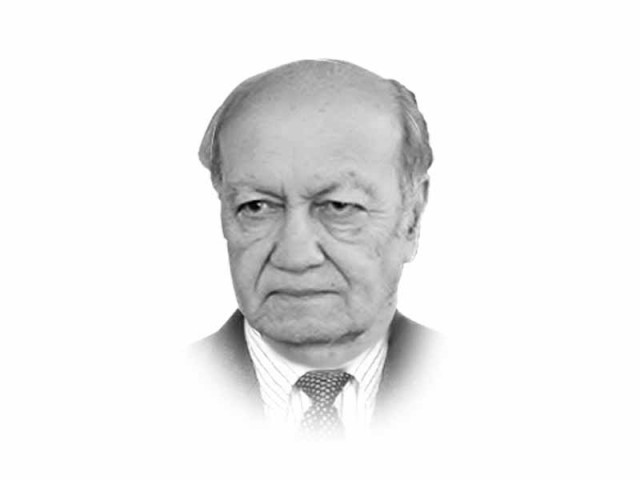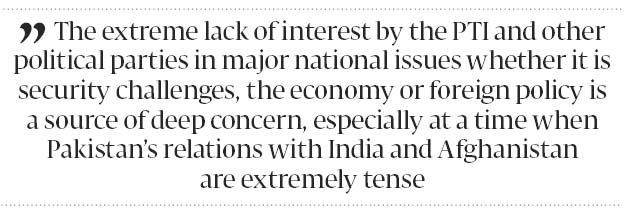Failure of leadership all around
The process of accountability should, however, not remain confined to the top political leadership only

The writer is a retired lieutenant general of the Pakistan Army and a former federal secretary. He has also served as chairman of the Pakistan Ordnance Factories Board
The fact that the country’s top executive is undergoing intense financial scrutiny clearly demonstrates how Pakistan in many ways is dramatically changing. Scrutiny of leaders worldwide is now an accepted norm and Pakistan can no more be an exception. Initially, there has been criticism of the composition of the JIT and two of its members were being objected too. The judiciary, however, set the objection aside. However, it is only fair to expect that the JIT members are not influenced by any institution or bear a grudge against the prime minister or his family. The allegation needs to be investigated so that the process remains aboveboard. Similarly, responsibility and moral obligation on the PM is even greater so that he does not use his office and political support as a shield against the course of justice. In all fairness, so far he has abided by these norms. Although Nawaz has been repeatedly saying that the trail of finances is his personal matter. True, but the public and private face of political leaders, especially those who hold top positions cannot be segregated. It is a basic norm of democracy that political leaders and high government officials remain open to parliamentary and public scrutiny so that their official position is not misused.
Imran Khan’s quest in demanding a thorough investigation is valid but innuendoes and the constant barrage of accusations against the PM belittle his stature. It also creates an impression that for capturing power he is willing to set aside political and societal norms. He should have confidence in the functioning of the JIT and the subsequent judicial process. By constantly making statements he gives an impression of impatience and a tendency to influence the outcome of JIT proceedings.

The JIT by default or design is also being made controversial. In all probability, its recommendations would then be interpreted and projected by the parties concerned in the light of how it affects them. Inclusion of the members of Military Intelligence and the ISI was a clear indication that the army leadership was interested in ensuring an independent investigation and also retaining its influence in the investigative process.
Furthermore, the PTI’s constant anti-government sloganeering and Imran’s personal assault on the prime minister has not only vitiated the political environment but has affected the entire political class and created doubts about their legitimacy in the eyes of the public.
The extreme lack of interest by the PTI and other political parties in major national issues whether it is security challenges, the economy or foreign policy is a source of deep concern, especially at a time when Pakistan’s relations with India and Afghanistan are extremely tense and with Iran there are differences on our joining the Saudi alliance and border skirmishes remain problematic.
This behavioural pattern of maligning opponents by using the political platform and neglecting major national issues needs to change. Our political leaders need to rewrite the rules of how they deal with national issues and how they advance their party and personal interests. At present, it seems the singular aim is to exploit the national crisis into an opportunity for personal gain. Moreover, extreme polarisation of politics has detrimental effect on societies that are in progression such as ours. It would also set a behaviour pattern that the PTI could face if ever it came to power at the national level. Imran being a role model for his young fans has an additional responsibility in this regard.
The process of accountability should, however, not remain confined to the top political leadership only. The nation expects similar standards be applied to other institutions be it the judiciary, security establishment, bureaucracy or media. In a way it should be systemic and there should be no sacred cows. The concept that the judiciary and the military have their own system of accountability and thus be dealt differently needs to be revisited. This practice is unique to Pakistan and is a legacy of our prolonged military rule when rules were framed to suit the power elite. We also have to assess how do other countries like Britain, India or Sri Lanka deal with this issue.
Accountability demands greater openness in government transactions whether they relate to projects, procurement or sale of assets. These should be compatible with good practices and according to internationally accepted standards. In our case scrutiny exercised by the public accounts committee of parliament and other parliamentary bodies remains perfunctory. First, there is a huge backlog of cases stretching over years that needs to be cleared on priority. It would not be wrong to assume that such indifference promotes a general acceptance towards corruption by society.
One way of defusing the current crisis would be that the government decides to hold early elections. As the prime minister himself has indicated that let the people give the verdict. It will also take the steam off the opposition and free the government from the current state of semi-paralysis. A constant media trial has created perceptions based on real or alternative facts that help in advancing the respective agenda of media owners and certain political forces but not necessarily reflects the reality. Nor is it helpful in resolving the current crisis. What Pakistan needs is that its leaders awaken to this grave present reality and seize the multiple opportunities our country offers by not infighting but serious leadership and good governance.
Published in The Express Tribune, June 21st, 2017.
Like Opinion & Editorial on Facebook, follow @ETOpEd on Twitter to receive all updates on all our daily pieces.
















COMMENTS
Comments are moderated and generally will be posted if they are on-topic and not abusive.
For more information, please see our Comments FAQ